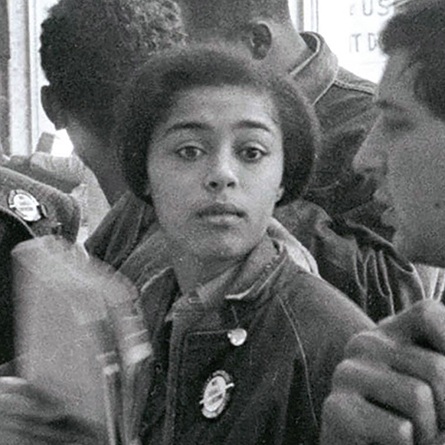Stark resident recalls civil rights activism
Emmy Award-winning documentarian Judy Richardson spent nearly a month at the College, visiting classes and screening her films.

Take the fact that the Black Lives Matter movement is often seen in the language of Twitter: #BlackLivesMatter.
“You can have thousands of likes and followers—and not know who any of those people are or what their motives are.”
Richardson acknowledges that social media is essential to the Black Lives Matter movement. After the racially charged incidents that exploded across U.S. cities like Baltimore and Ferguson, the hashtag turned from a rallying cry into an important vehicle for organizing protests against racial profiling and police brutality. Social media channels helped fuel the movement that swept across the U.S.
“Social media is a valuable tool, but it is just that: a tool,” she says.
Online, “you’re talking at people not with them.” Fortunately, she adds, many young activists also understand the need for long-term grassroots organizing.
This April, Richardson joined the College community as the Fran and Ray Stark Distinguished Guest Resident in Film Studies. The residency brings leading scholars and artistic professionals involved with the production, distribution and interpretation of cinema to campus for intensive engagement with students in the Film Studies Program. Richardson screened several of her PBS and History Channel films, in addition to bringing PBS filmmakers and book editors to campus for lectures. She also lectured herself in both film and African-American history and culture classes.
“By teaching, presenting her films, and bringing activists and artists to campus, Judy imparted to Conn students the indissoluble gift of her wisdom,” says Elizabeth Reich, assistant professor of film studies, “reminding us that whether freedom fighter or filmmaker, we follow those who have come before us, standing on their shoulders and drawing from their strength.”
Richardson is undoubtedly a freedom fighter. She left Swarthmore College to join the staff of the Student Nonviolent Coordinating Committee (SNCC) in the 1960s, working closely with activists like Julian Bond and Stokely Carmichael, first in SNCC’s national office in Atlanta and then in Mississippi and Alabama. Richardson’s activism led to a career as a writer, publisher and, eventually, a filmmaker, best known for co-producing the Academy Award-nominated, 14-hour PBS documentary series Eyes on the Prize and the Emmy Award-winning Malcolm X: Make It Plain.
But college campuses are where Richardson finds comfort, and where her own activism began. She has been a visiting professor at Brown University and currently has a residency at Duke University. On the many campuses she visits—Connecticut College included—Richardson has witnessed students willing to fight for social justice, just one of the many parallels and connections she sees between the Civil Rights Movement and the Black Lives Matter movement.
"A lot has changed. I can go to Ole Miss or Vanderbilt now and walk around campus without fear,” she says. “But many of the issues are the same—police brutality, voter suppression, major economic inequities. The system hasn’t changed; it got some new clothes.”
Richardson remains tied to activism. In addition to film consultancies and traveling for college lectures and teacher development workshops, she serves on the board of directors of the SNCC Legacy Project and recently helped organize a threeday voting rights conference at Duke, bringing young activists from Black Lives Matter and immigrant rights groups together with SNCC veterans.
One of the most important lessons she tries to impart to the young activists she meets: You may not see the change you’re working for, but if you do nothing, nothing changes.
“Those who are afraid of sharing power with communities of color in this country are doing everything to stop [today’s social activists]—through voter suppression and the massive funding of political campaigns to keep themselves in power,” Richardson says.
But the great equalizers, she adds, are voting and grassroots organizing.
“The folks who are fighting to stop this expansion of democracy don’t get to win—because they’re wrong.”